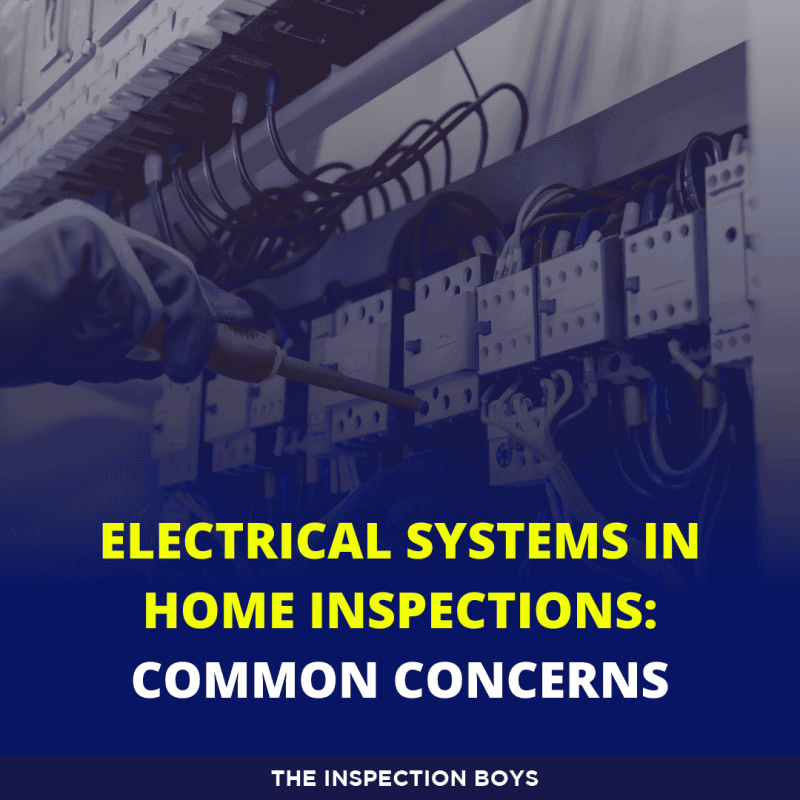When it comes to home inspections, electrical systems are one of the key areas that licensed home inspectors pay close attention to. Electrical issues can not only affect the functionality of the home but also pose serious safety risks. Faulty wiring or outdated systems may lead to dangerous conditions like electrical fires or electrocution. Understanding common concerns found during a home inspection can help homeowners and buyers take the necessary steps to ensure their electrical system is both safe and efficient.
Outdated Wiring Systems
One of the most common issues that home inspectors encounter is outdated or improper wiring. Many older homes were built with wiring systems that are no longer up to current safety standards. Homes with aluminum wiring, for instance, can pose significant risks due to the metal’s tendency to overheat, which can lead to fires. Similarly, knob-and-tube wiring, an older type of electrical setup, lacks grounding and is often found to be unsafe by today’s codes.
Homeowners considering selling an older home or buyers looking at older properties should take this into account. Hiring a professional for a thorough inspection of the electrical system can identify these outdated components, and it’s crucial to update or replace them to meet modern standards. Home inspection services are vital in ensuring that all electrical elements of the house are functioning correctly and safely.
Electrical Panel Issues
Another common concern during a home inspection is an outdated or insufficient electrical panel. The electrical panel, often referred to as the breaker box, is essentially the heart of a home’s electrical system. It controls the distribution of electricity throughout the house. Older panels may not have the capacity to support the electrical demands of modern households, which rely on a multitude of appliances, devices, and technology.
For example, homes built 30 or 40 years ago typically have panels rated for around 60 to 100 amps. However, today’s households often require 150 to 200 amps to support computers, high-powered kitchen appliances, HVAC systems, and other electronics. If the electrical panel isn’t able to handle this load, it could lead to power outages, tripped breakers, or worse, overheating that could lead to fires. A licensed home inspector will carefully evaluate the capacity and condition of the electrical panel and recommend upgrades if necessary.
Improper Grounding
Proper grounding is critical for safety, and home inspection services frequently discover grounding issues during their assessments. Grounding provides a path for electrical current to flow back to the ground in case of a fault. Without proper grounding, electricity can take unintended paths, potentially causing shocks or fires. Older homes or homes that have undergone DIY electrical work are especially prone to grounding problems.
Inspectors will check whether outlets are properly grounded and ensure that the electrical system as a whole is functioning as it should. Addressing grounding issues may require the installation of ground fault circuit interrupter (GFCI) outlets in areas where water is present, such as kitchens, bathrooms, and garages. These outlets can shut off electricity in case of a fault, further enhancing safety.
Overloaded Circuits
Overloaded circuits are another concern that home inspectors often find. This occurs when too many appliances or devices are connected to a single circuit, exceeding its capacity. When circuits are overloaded, they can overheat and potentially cause fires. A qualified inspector will check the distribution of electrical loads to ensure that each circuit is appropriately configured and not at risk of overload.
Sometimes, the solution is as simple as redistributing the electrical load across multiple circuits. In other cases, adding new circuits or upgrading the electrical system may be necessary to ensure it can handle the home’s electrical needs safely.
DIY Electrical Work
Another common issue found by home inspection services is amateur or DIY electrical work. While it may seem convenient and cost-effective for homeowners to perform their own electrical repairs or installations, improper work can lead to a host of problems, from faulty wiring to safety hazards. Inspectors often encounter improperly installed outlets, poorly spliced wires, and other substandard repairs that don’t meet code.
A licensed home inspector will identify these issues during the inspection and recommend that they be corrected by a licensed electrician. DIY electrical work, especially when done incorrectly, can void insurance policies and create a liability issue for the homeowner or future buyers.
Final Thoughts
A thorough inspection of the electrical system is essential for ensuring the safety and functionality of a home. From outdated wiring to improperly grounded outlets, the potential risks are too great to ignore. By relying on home inspection services and working with a licensed home inspector, homeowners and buyers can identify any concerns early on and take the necessary steps to ensure the home is safe, up to code, and ready for modern living.

